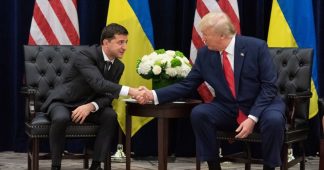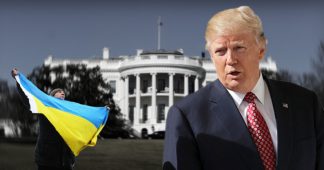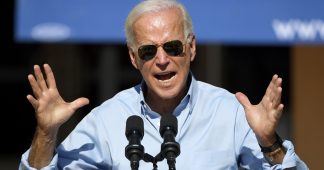By Clara Weiss
2 October 2019
The scandal over Trump’s blatant attempts to pressure Ukrainian president Volodymyr Zelensky into investigating the son of the leading Democrat Joe Biden, which now forms the basis for a CIA-backed investigation into the possible impeachment of Trump, has thrown the Ukrainian oligarchy into deep crisis.
The Ukrainian parliament (Rada) has formally requested that the government publish the entire transcript of the phone call. Following the release of the CIA-whistleblower memo, the US special envoy to Ukraine, Kurt Volker, resigned. He had been mentioned as being involved in arranging meetings between Trump’s personal lawyer Rudolph Giuliani and members of the Zelensky administration. Former Ukrainian president Petro Poroshenko lamented Volker’s resignation as a blow to US-Ukrainian relations.
The transcript of the July 25, 2019 phone call sheds stark light on the slavish dependence of the Ukrainian oligarchy on US imperialism. In response to Trump saying that the US had been “very, very good to Ukraine,” Zelensky replied: “Yes you are absolutely right. Not only 100 percent, but actually 1,000 percent … I did talk to Angela Merkel and I did meet with her. I also met and talked with Macron and I told them to … It turns out that even though logically, the European Union should be our biggest partner but technically the United States is a much bigger partner than the European Union …”
When Trump pushed him to get the Ukrainian attorney general involved in probing the Mueller investigation, Zelensky said: “It is very important and we are open for any future cooperation. We are ready to open a new page on cooperation in relations between the United States and Ukraine.” Zelensky said that they had already replaced their ambassador to the US for that purpose and that one of his assistants had personally spoken with Giuliani and that he would himself meet with Giuliani in Ukraine. Zelensky then stated that the attorney general, who at that point had not yet been confirmed by the Ukrainian parliament, was “100 percent my candidate, who will be approved by the parliament and will start as a new prosecutor in September.”
The chronology of events indicate that Trump, to pressure the government in Kiev, withheld a total of $400 million in military aid to the country that had already been approved by Congress.
An article in the New Yorker suggested that the Trump administration exploited as leverage Zelensky’s desperate efforts to arrange a personal meeting with the US president. Immediately upon taking office, Zelensky sent advisers to Washington to lobby for a personal meeting, without success. According to one source in the Zelensky administration, one group of US officials told the advisers that showing willingness to launch an investigation into Hunter Biden “would help.”
The Ukrainian government source told the New Yorker: “The first [group of advisers in Washington] was saying, ‘Here’s what you need to do in order to get acceptance, so to say, and support,’ The second was saying, ‘You cannot do this, it will put you in danger.’ The cacophony of voices and agendas emerging from Washington was disorienting and dispiriting.”
In the end, the Zelensky administration did not launch an investigation into Biden.
The European press extensively commented on Zelensky’s dismissive remarks about Macron and Merkel, suggesting that they would damage the relationship between Ukraine and those countries. Both Paris and Berlin declined to comment on the transcript publicly.
The Ukrainian media has been systematically trained to downplay the scandal and its impact on Ukraine, covering it as little as possible. All official statements by the Ukrainian government have emphasized that Kiev was not taking any sides to disputes that are internal to the United States and that Ukraine was a “sovereign country.”
Zelensky admitted on Wednesday that he had thought that only Trump’s side of the call would be published and that he believed that details of such calls “between presidents of independent countries” should sometimes not be published. Trying to smooth things over with Merkel and Macron, he stated he had made his remarks about them during “a difficult period … I don’t want to say anything bad about anyone. We thank everyone who helps us.”
Zelensky’s speech before the UN general assembly combined a plea for military and political aid to Ukraine, with the warning that an escalation of the conflict in Ukraine could lead to a third world war. Concluding his remarks, Zelensky said, “Someone says now: ‘There will be no World War III. It will be the last one.’ I hope this phrase is an awareness of the threat to the planet, not an announcement.”
The scandal lays bare both the utter dependence of the Ukrainian oligarchy upon US imperialism, and the virtually insoluble dilemma it is facing in trying to balance between the different imperialist powers and Russia.
With the EU and the US embroiled in an escalating trade war, and tensions over US foreign policy in the Middle East, the Ukrainian oligarchy has been desperately seeking to maneuver between the different powers and, to some extent, trying to play them off against each other.
France, in particular, has made major efforts to influence the Zelensky administration. French officials, speaking on condition of anonymity, told Reuters that Macron had gone out of his way to meet Zelensky before the latter’s election—something that went against normal protocol. In August, Ukraine and Russia completed a high-profile prisoner swap, which is widely seen as a step toward the Normandy talks, to be held without US participation, about a potential settlement of the conflict in East Ukraine.
It is very possible that the prisoner swap, which to some extent marked a reversal of Zelensky’s earlier attempts to gain support from Germany and France for harsher sanctions against Russia, was at least in part a response to the pressure exerted by the Trump administration.
Media reports suggested that Macron had played the principal role in pushing for the prisoner swap. The Financial Times interpreted it as a part of Macron’s attempts “to strengthen European ties to Russia to secure Moscow’s cooperation in other international crises, in particular the dangerous dispute over Iran’s nuclear ambitions.” Berlin also backed the prisoner swap, with Merkel calling it a “hopeful sign.”
Imperialist war planners have historically considered the resource-rich Ukraine, which is geographically located at the crossroads between Europe and Asia and the strategically important Black Sea, as key to a domination of the Eurasian landmass. Control over Ukraine was central to the efforts of German imperialism to control Europe in both World War I and World War II, when the Nazis systematically worked with local bourgeois fascist forces to murder the country’s Jewish population and wage war against the Soviet Union.
Since the days of the Cold War, the US has been heavily involved in fostering right-wing political forces in the country to help bring it under its control. Following the dissolution of the USSR and the restoration of capitalism by the Stalinist bureaucracy, the Ukrainian oligarchy, while maintaining extensive ties to Germany and to some extent France, has been heavily dependent on and influenced by US imperialism. As a central component of the efforts of US imperialism to encircle and isolate Russia, both Republican and Democratic administrations have staged two “color revolutions,” in 2004 and in 2014, to bring to power pro-US presidents in Kiev.
Following the 2014 US- and EU-backed toppling of the pro-Russian president Viktor Yanukovych with the heavy involvement of far-right forces, then US Assistant Secretary of State Victoria Nuland stated that the US had pumped some $5 billion into Ukrainian “civil society.” Since 2014, the US has stationed military advisers throughout the country, and the United States Agency for International Development (USAID) alone spent another $2 billion in Ukraine.
Published at https://www.wsws.org/











